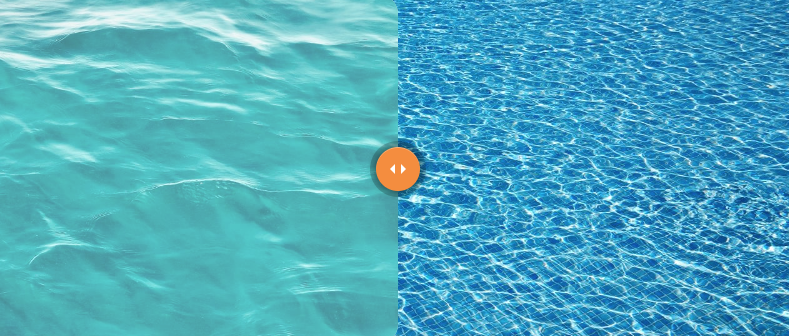Saltwater and chlorine pools are two of the most popular pool cleaning systems on the market. While both are great for cooling off and getting exercise, these two types of pools operate on relatively different cleaning systems, each with its own benefits and drawbacks. Saltwater pools require less maintenance, while freshwater chlorine pools have a lower initial cost. But on the other hand, saltwater pools require more electricity while chlorine pools may have negative long-term effects on your skin and hair.
On This Page
- What’s the Difference Between Saltwater and Chlorine Pools?
- Saltwater vs. Chlorine Pools: Pros and Cons
- Salt vs. Chlorine Pools: Which Is Best?
- Chlorine vs. Saltwater vs. UV Pools
What’s the Difference Between Saltwater and Chlorine Pools?
Chlorinated pools are often the first thought when people think of jumping into a pool in their backyard. But saltwater pools are starting to gain popularity for their lower maintenance and gentler effect on skin and hair.
Saltwater Pools
While the water in saltwater pools may be salty, it doesn’t actually come from the ocean. Instead, saltwater pools use regular pool water with salt added in. Salt is necessary for pools, as its chemical structure contains chlorine which can then be used to help keep your pool clean and free from certain microbes.
Saltwater pool systems use electrolysis to produce low levels of natural chlorine. A generator will convert the salt into low amounts of chlorine, adding enough to keep the water clean without using excess chemicals. You should only have to check the salt levels of the pool once a month.
Because you’re using an electrolysis generator, saltwater pool systems often have a larger upfront cost.
Chlorine Pools
Chlorine pools rely on a chemical system to balance out the chlorine within the pool. Using chlorine tablets, sticks, or liquids, you must balance out the amount of chlorine in the pool to avoid potential hazardous results. You’re also going to need to do this weekly and likely anytime it rains.
Chlorine produces a lot of dangerous fumes, so it’s best kept in a well-ventilated storage area. This typically means a shed outside of the home.
Saltwater vs. Chlorine Pools: Pros and Cons
To decide which is better for your individual situation, you’ll need to consider the benefits and drawbacks of chlorine pools vs. saltwater, such as the initial cost to install, potential health risks, and whether you’re looking for a return on investment or not.
Saltwater Pool Pros
- Low-Cost Annual Maintenance
The average annual cost to maintain a swimming pool is anywhere from $100 to $400. Saltwater pools will fall anywhere from $70 to $100 annually, as you don’t need to balance the chemicals nearly as often. You will need to add in the cost of saltwater cells every five to seven years, which costs around $200 to $800 on average.
Comparing this to chlorine pools, which can quickly get into the $1,000s if you’re constantly needing to buy chlorine and balancing agents to maintain the pool.
- Simple Maintenance
There is less work required to keep a saltwater pool clean as compared to its chlorine counterpart.
- Easy on Eyes, Skin, and Hair
High levels of unbalanced chlorinated pools have been associated with skin, respiratory, and visual concerns. Saltwater pools don’t contain toxic fumes from the chlorine chemical, don’t require any special storage requirements, and tend to be more gentle on the skin and respiratory. Though it may still be rough on the eyes.
- Best for Return on Investment (ROI)
While saltwater pools have a higher initial cost, their low operational costs and lack of health concerns will likely make them appealing to future buyers. Generally speaking, you can expect to recoup the entirety of your initial investment when selling your home.
Chlorine pools will still offer a decently high ROI as well though. Pools are considered a luxury item, so they almost always offer a positive ROI.
Saltwater Pool Cons
- More upfront cost
The initial investment to convert a pool to saltwater makes this the more expensive option in terms of upfront costs. Most of the cost is due to changing a pool over to a saltwater system.
Chlorinated Pool Pros
- Low Initial Investment
The average swimming pool installation costs anywhere from $11,000 to $36,000. In most instances, inground pools will cost more than their above-ground counterpart. Most chlorinated pools will only need to tack on an extra $100, not much compared to the cost of converting a pool to saltwater, which will add on an extra $2,500 on average.
- Requires Less Features and Equipment
Chlorine pools simply need three items to get up and running:
- Pump
- Filter
- Chemicals
You may also want to purchase an automatic chemical balancing controller for the water. Over time, there’s less risk of salt corroding the pool equipment.
Saltwater pools will also need a pump and a filter, but you’ll need to add in a saltwater generator and saltwater cells. If you don’t use the right pump and filter, you may see an increase in maintenance costs as the equipment erodes.
Chlorinated Pool Cons
- Can Be Harsh on Eyes, Skin and Hair
Pools that contain chlorine sometimes cause irritation to people’s eyes, skin, and hair, though not every person is affected.
- Requires More Maintenance
Compared to saltwater pools, chlorinated pools need more frequent maintenance to ensure the chemicals are working properly. You may need to adjust chemicals weekly—especially after rain.

Salt vs. Chlorine Pools: Which Is Best?
You have two main options when choosing pools, above-ground and inground. Which you choose to go with will play an impact on the type of system you find optimal.
For In-Ground Pools
Best for Inground Pools: Saltwater Pools
Inground pools cost anywhere from $35,500 to $64,500 on average. If you choose to go for an inground pool, you should decide what system works for you before you finalize plans. The reason is that you can choose a liner for the inground pool that can handle saltwater from the get-go.
If you already have an inground pool, you should check to see if your currency liner can handle chlorine to saltwater conversion. The wrong liner can lead to an increase in erosion, decreasing the lifespan of your inground pool. If installing a new liner adds too much to the cost, you may want to consider leaving the chlorine system in place.
For Above-Ground Pools
Best for Above-Ground Pools: Tie
There’s no real winner for whether you should choose a saltwater or chlorinated system for an above-ground pool. Though, above-ground pools cost around $850 to $5,000. Because of this lower cost to install compared to inground pools, you may be able to use the savings to pay for the saltwater system.
Otherwise, you should use other considerations such as maintenance, health, and resale value to determine which system is right for you. You may want to hire a local above-ground pool installer to help you make the right decision.
Chlorine or Saltwater vs. UV Pools
UV Pool Cost
UV pool systems utilize UV light in a sanitation chamber located outside the pool to kill germs, parasites, algae, and other microbes. These systems fall above chlorine systems in cost but typically below saltwater systems. Expect to pay around $500 to $2,000 for a UV light pool system.
UV Pool Health and Safety
UV light pool systems still require the use of a little chlorine, but not to the same extent as a pure chlorine system. The reason for the chlorine is that residential pools often don’t typically have enough circulation of water to get all of the water through the UV light in a timely manner. To fully prevent any microbes from affecting you, extra chlorine is added.


